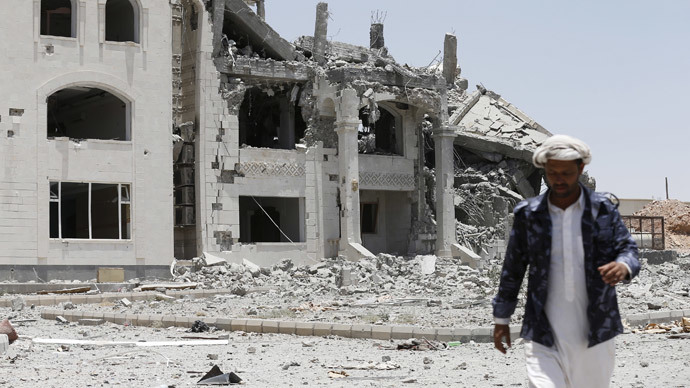Yemen conflict: ‘severe disruption of food, medicines, fuel supplies’

There are two main concerns in the Yemeni conflict - its impact on civilians and humanitarian consequences, Joe Stork, Deputy Director for Middle East and North Africa at Human Rights Watch, told RT.
RT:What are some of the biggest challenges when it comes to preserving people’s basic rights in situations like the one in Yemen?
Joe Stork: Whenever you have an armed conflict like this obviously the impact on civilians is going to be the first concern. We’ve seen a bombing campaign that has been going on over a month now; we’ve seen around 600 civilians killed according to UN figures. That means…the numbers of wounded are quite a bit higher than that. Many of them - about 100 of the civilians the UN says - are children. So that has got to be out first concern. The second concern is humanitarian consequences - the fact that there has been a really severe disruption in terms of supplies of food, of medicines, supplies of fuel - perhaps the most important in Yemen today - for transportation, but also for generators to provide electricity that is needed to pump water into apartment buildings for instance. There things are seriously lacking.
READ MORE: Yemen suffers vital food and aid shortages as shelling continues
RT:We’re getting reports that there are food shortages in Yemen because the Saudi-led coalition is checking ships for weapons and holding them up. Has your organization been in contact with the coalition, or taken other steps to ensure that people get access to these vital basic supplies?
JS: In a war situation like this, the combatant parties - in this case Saudi Arabia - do have a right under the laws of war [to] check for this kind of things. The question is - and I’m afraid I don’t know the answer – are they doing this in the most expeditious way possible? Are they checking them? Do they have teams on the ground or in this case on the high seas, on the water able to do fairly rapid checks and let the ships that clear the checks get into port, unload and so forth. But again, here we have a situation where [there is] a lack of fuel, the bombings of airports, road and bridges - all of that is going to have terrible consequences in terms of getting humanitarian assistance where it’s needed.
RT:When there was a Gaza war, rights groups said that the scale of death and destruction there could amount to war crimes. Would you say the same about Yemen right now?
JS: First of all we don’t make those judgments on the basis of scale of destruction. You have to examine particular incidents ... So we don’t go by number of buildings… that’s not how you determine whether war crimes have been committed.
RT:Why does the US show that they have some responsibility in this conflict in Yemen? Is it because of its world power status?
JS: No, not because of its world power status, but because to the extent it is providing assistance to this Saudi-led coalition, to the extent that it’s providing intelligence for instance which they say they are providing. On that basis that they share some responsibility for making sure those serious incidents are in fact investigated.
RT:So how can you determine whether it’s a war crime or not?
JS: The only way you can determine that is on the basis of pretty careful investigation. You have to have a secure situation on the ground in order to carry out those investigations. And that’s not what we have in Yemen today.
The statements, views and opinions expressed in this column are solely those of the author and do not necessarily represent those of RT.
The statements, views and opinions expressed in this column are solely those of the author and do not necessarily represent those of RT.












